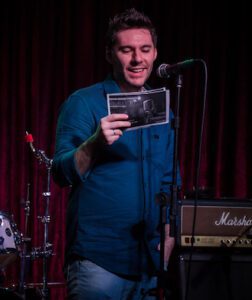It is very difficult to give a definite yes or no to this question. Let’s keep it up and you read until the end of the post and understand what’s best for you, agreed?
While it’s true that some people sing well without knowing ANYTHING about theory, it’s also true that ALL people (whether they already sing well or not) benefit from studying music theory. Those people who sing well without having studied theory are actually a very small part of the world’s population and are considered exceptions.
Let’s imagine the following: you’re a little overweight and you’re looking for a doctor to help you solve it. The doctor advises you to exercise regularly and follow a diet (these are just examples – there may be other causes for you to be overweight….). But then you remember your friend John, who is super skinny, doesn’t exercise and eats McDonald’s every day. So you tell the doctor that you will do the same as your friend João. We can call this “João’s Paradox” lol.
It’s unreasonable, right? What if I say that there are a lot of people who do this with singing? In other words, they know “João da Música” who doesn’t take classes, doesn’t regularly study vocal technique exercises, doesn’t take care of his voice and doesn’t know anything about theory, but he sings well. So these people decide to follow João’s example. The result: most NEVER manage to sing well and sometimes even blame the so-called “talent”.
We should treat exceptions as exceptions and never as a rule!
Of course, the most important part of theory for the singer is what we call Musical Perception (in English, Ear Training). With a well-trained ear, for example, we can handle many tuning problems. So, no matter how dedicated you are in classes and studying vocal technique, maybe part of your not being able to sing well comes exactly from a low level of ear training. You should look for classes that teach this (here in the studio we also work with theory and perception) or at least study alone. I’ve shared many tips in other posts (check out the blog), but don’t forget to download www.earmaster.com EVERY day . It will change your life!
Some people who arrive here at the studio also have difficulty with rhythm. They either miss entries or get lost in the middle of the song, singing faster or slower than they should. The Ear Master here also helps and should be complemented with Rhythmic Solfeggio exercises (solfeggio = music reading). I recommend the Theoretical and Practical Guide to Teaching Musical Dictation – Volumes 1 and 2 by Ettore Pozzoli ( his link on Amazon ) which, in addition to having a good explanation of rhythm at the beginning, also has a series of practical exercises.
Whether it’s difficulty with tuning or with rhythm, I recommend everyone a theory book in general, which is Theory of Music by Bohumil Med ( link to it on Amazon ). Also study the site www.musictheory.net , it is very good.
The interesting thing about studying “pure” theory is that it makes listening much easier. For example: if you know that a certain song is in C Major and you know how a major scale is formed, you already narrow down the universe of notes that the singer may be singing in that passage and it is easier for you to find the note that is wrong.
One of the only scenarios I can think of that someone doesn’t need to study theory is if they meet all these requirements:
– DO NOT want to work professionally with music;
– be VERY confident in tuning and not miss notes unless it is a difficulty in vocal placement (for example, a very high note);
– be VERY secure in rhythm, don’t miss the entrances or sing slower or faster than the original song asks for.
Even if you fit ALL these parameters at the same time, you would benefit greatly from studying Theory! Anyone interested in Opera and Musical Theater should also study Rhythmic and Melodic Solfeggio because sometimes we only have access to the music scores.
And if you want to work or already work with popular or classical music, there’s no excuse! Study Theory, Ear Training and the Solfeggios. It’s like Portuguese for a lawyer, you have to know!

